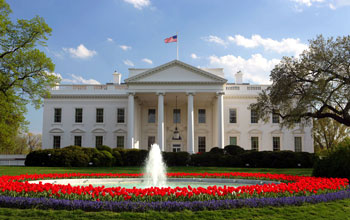News Release 08-214
Beginning Scientists Receive Presidential Awards
Twenty NSF nominees receive the government's highest honor for scientists and engineers beginning their independent careers
December 19, 2008
Embargoed until December 19, 2008, 3:30 p.m.
This material is available primarily for archival purposes. Telephone numbers or other contact information may be out of date; please see current contact information at media contacts.
Twenty young scientists from among those taking part in the National Science Foundation's (NSF) Faculty Early Career Development Program (CAREER) have received an additional distinction as winners of Presidential Early Career Awards for Scientists and Engineers (PECASE) for the 2007 competition.
The PECASE program recognizes outstanding scientists and engineers who, early in their careers, show exceptional potential for leadership at the frontiers of knowledge. This Presidential Award is the highest honor bestowed by the U.S. government on scientists and engineers beginning their independent careers. In addition to NSF's winners, there are 48 scientists nominated by other government agencies.
By receiving awards through the CAREER program, the PECASE winners had already demonstrated their success in integrating research and education within the context of the mission of their organization.
"We take great pride in the PECASE winners," said Kathie L. Olsen, NSF's deputy director. "It is important to support the transformational research of these beginning scientists, and to foster their work in educational outreach and mentoring."
A complete list of NSF's PECASE awardees and their institutions follows:
Sonia Altizer, Odum School of Ecology, University of Georgia
Maura J. Borrego, Department of Engineering Education, Virginia Tech University
Xi Chen, Department of Civil Engineering and Engineering Mechanics, Columbia Universit
Kim M. Cobb, Department of Earth and Atmospheric Sciences, Georgia Institute of Technology
Michael Elowitz, California Institute of Technology
Nicholas Feamster, College of Computing, Georgia Institute of Technology
Alexander Gamburd, Department of Mathematics, University of California, Santa Cruz
Jeremy Gray, Department of Psychology, Yale University
Sanjay Lall, Department of Aeronautics and Astronomics, Stanford University
André W. Marshall, Department of Fire Protection Engineering, University of Maryland, College Park
Mónica Medina, School of Natural Sciences, University of California, Merced
Katrina M. Miranda, Department of Chemistry, University of Arizona
Subhasish Mitra, Department of Electrical Engineering and Computer Science, Stanford University
Stergios I. Roumeliotis, Department of Computer Science and Engineering, University of Minnesota
Sanjit Seshia, Department of Electrical Engineering and Computer Sciences, University of California, Berkeley
Aaron M. Thomas, Department of Chemical Engineering, University of Idaho
Paul Torrens, School of Geographical Sciences, Arizona State University
Anastasia Volovich, Department of Physics, Brown University
Joan Walker, Department of Civil and Environmental Engineering Center for Global Metropolitan Studies, University of California at Berkeley
Michael Yu, Department of Materials Science and Engineering, Johns Hopkins University
-NSF-
Media Contacts
Maria C. Zacharias, NSF, (703) 292-8454, email: mzachari@nsf.gov
The U.S. National Science Foundation propels the nation forward by advancing fundamental research in all fields of science and engineering. NSF supports research and people by providing facilities, instruments and funding to support their ingenuity and sustain the U.S. as a global leader in research and innovation. With a fiscal year 2023 budget of $9.5 billion, NSF funds reach all 50 states through grants to nearly 2,000 colleges, universities and institutions. Each year, NSF receives more than 40,000 competitive proposals and makes about 11,000 new awards. Those awards include support for cooperative research with industry, Arctic and Antarctic research and operations, and U.S. participation in international scientific efforts.
Connect with us online
NSF website: nsf.gov
NSF News: nsf.gov/news
For News Media: nsf.gov/news/newsroom
Statistics: nsf.gov/statistics/
Awards database: nsf.gov/awardsearch/
Follow us on social
Twitter: twitter.com/NSF
Facebook: facebook.com/US.NSF
Instagram: instagram.com/nsfgov



